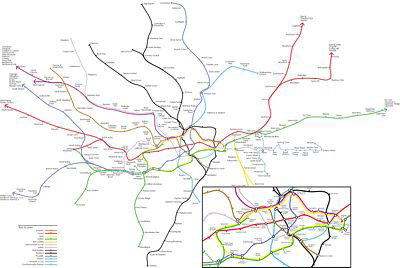No Light Rail in Vancouver!
There is a town in England that is worried that people won’t consider it a “world-
You can see why London’s political leaders are worried that people don’t consider
it to be a “world-

Not enough trains to be a world-
Seriously, whenever anyone starts using the term “world class,” better check your wallet, because they mean to pick it. When they emphasize jobs at the top of the list of benefits, you can be sure you are going to lose.
In this case, London wants to build a “world-
Some documents say 8 billion pounds (about $16 billion). Some say 10 billion pounds. But now that the project has received parliamentary approval, they are saying 16 billion pounds, or more than $32 billion. This supposedly makes it Europe’s largest civil engineering project.
Most of the money is supposed to come from fares and from taxes paid by businesses located near line that expect to benefit from it. But British taxpayers are expected to shell out a third of the cost, or well over $10 billion. Anyone care to bet on how much this thing will go over budget?
What will Britain get for this? The rail line is known as “Crossrail” (because it
will cross London). On-
The trains are supposed to run at “up to 100 mph” above ground and 60 mph underground. But with stations spaced about every two miles, don’t expect the average speeds to be anywhere close to those maximums.
According to news reports, Crossrail will “generate an additional 30,000 jobs and
help retain London’s position as the world’s pre-
As far as transportation goes, they project they will be able to run 24 trains per hour each carrying up to 1,500 people. That’s 36,000 people past a point every hour. That’s pretty good, if the trains are full — but how likely is that? They might be full in the city center, but the fringes of the system, with exactly the same capacity, are likely to be empty. The advantage of highways or buses is that they can taper off as you get to areas of less demand.
“More than 160,000 passengers will be carried in the morning peak period,” documents predict. But there are more than 1.2 million jobs in the London central business district. So, at best, Crossrail will carry 13 percent of commuters to work.
The existing rail system currently carries about 4 million trips per day. Commuter trains carry about 1.5 million per day. It is likely that the high cost of Crossrail will lead to a budget cuts for London’s subway lines, if not the commuter trains (which are privately operated).
So who is going to benefit from Crossrail? The usual suspects: Rail engineering companies and builders. Rail car manufacturers. Downtown London property owners. Who will pay? Everyone else, at least in Britain.
If I sound cynical, it is because they are applying a mid-
Trackback • Posted in Transportation
Wanted: World-

0
Reprinted from The Antiplanner